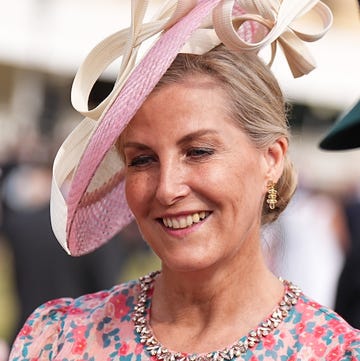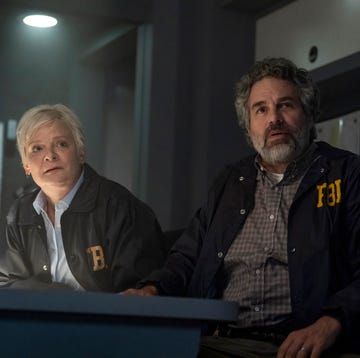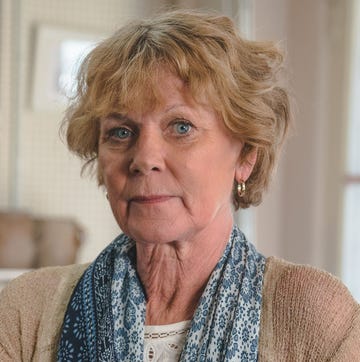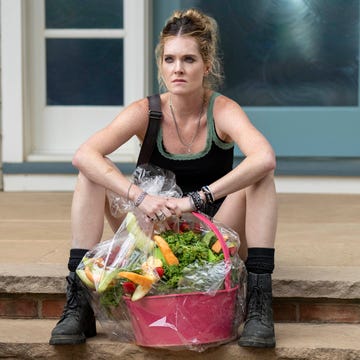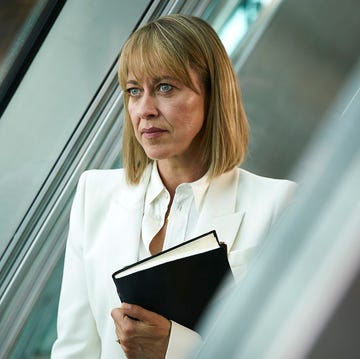Love Good Housekeeping and want more of our Triple-Tested recipes, home tips, fashion inspiration, essential consumer advice and so much more delivered to your inbox? Sign up to our FREE weekly newsletters, sit back and enjoy!
'YES... I feel reassured and connected'
Karen Evennett shares how she finds comfort in knowing where her two adult daughters are.
My husband has persuaded his nonagenarian mother to get an iPhone. Motivated, it transpires, by his wish to track her on Apple’s Find My Friends. When he told me, I laughed out loud: ‘You’re imagining she’ll actually take it out with her.’ In reality, the phone will remain in her house at all times, most probably switched off. Unlike our grown-up daughters, who we freely track, there will be no way to monitor her trips to Waitrose or Scrabble club. Although Coco is 36 and Bella is 28, we track their locations on Find My Friends. It’s a two-way process – they can also see where we are – and we’ve been doing it for so long it feels completely normal. It’s only when I mention it to friends that I realise it’s not.
While many parents interfere with other aspects of their adult offspring’s lives – where they should live or what job they should do – I don’t know anyone else who follows their kids on Find My Friends. For us, though, it’s a mutual comfort. As often as I click on their names for the strange pleasure of seeing their little grey spots travelling to work, it seems they also like to check up on our whereabouts. I know this because if I’m not where they think I should be, I get texts asking, ‘What are you doing in Baker Street?!’
However, Find My Friends does have the drawback of triggering anxiety attacks when unusual locations flag up. We want to know that our daughters are safe, not to intrude on their privacy. But if I see Bella is in an unfamiliar area of London late at night, my heart will start to race. Is she on her own? Will she get home safely? Then there’s the conundrum of what to do next. I don’t want to barge in on her night out by firing off a worried mum text, but I may take intermittent peeps at the app to make sure she’s travelling in the right direction.
Coco once appeared to have spent the night in Harrow, miles away from where she lives, and, unable to contact her, we feared she’d been abducted. It turned out she’d dropped her phone in a taxi – which is where it was languishing, outside the driver’s house. Another time, she seemed to be in Homerton University Hospital. We found out she was staying with friends who lived near there – but not before Bella had called the hospital to ask if her sister had been admitted. Find My Friends, it turns out, is not always 100% accurate.
In a recent US survey, a quarter of parents admitted to tracking their adult children, mostly to find out their location. Only 9% of the 18- to 34-year-olds who took part said they felt that their parents were too involved in their lives. A 2019 survey of UK parents and guardians also found that 40% were using some kind of GPS tracking on a daily basis.
So, what’s the problem? Compared to other forms of meddling, a little bit of Find My Friends seems quite innocuous. My husband, Steve, and I have never been over-involved ‘helicopter’ types; our parenting style has always been more jellyfish-style – floppy, veering towards sloppy. We’re also Luddites who would never have discovered Find My Friends if Coco hadn’t suggested using it when she was travelling to Italy, aged 30.
Six years on, tracking the family remains a way of feeling connected without having to keep phoning or texting. But one friend did recently say, ‘I hope you don’t use that inappropriately!’ I don’t think I do. I hope I don’t. But I guess it’s the trackee, not the tracker, who’d make that call. And, of course, Coco and Bella are free to remove themselves from the app anytime they want. As are we. But if I one day tap on Find My Friends and see they’ve gone, I do wonder how I’ll cope!
'NO... we need to protect our freedom'
Joanna Moorhead explains why she believes monitoring family members’ locations is an invasion of privacy.
A wise relative once said to me, 'Safety, under any circumstance, is an illusion,' and it's a maxim I've lived by ever since. There’s never an entirely risk-free way to live: even choices that may appear safe are never entirely so and sometimes bring other kinds of risks you haven’t considered. For me, tracking family members on their phones falls into this illusion of safety. Yes, I could get permission to track the movements of my four adult daughters, who are aged between 22 and 32, but what advantage would it give any of us?
My youngest daughter recently spent 10 weeks travelling in South America. If I’d been tracking her, I could have seen exactly where she was in Argentina and Colombia, Bolivia and Brazil, but how would I have known she was safe? The only way to be sure would have been to contact her directly, which would encroach on her space. In fact, I think it would have worried me more to see that she was in some remote area of a faraway country that I couldn’t reach.
Here’s the thing about having children: you raise them to let them go. For me, that means giving them the freedom to make their own choices, take their own risks and make their own mistakes. Micromanaging their lives – including tracking their movements – isn’t part of the job description.
Parents dance a careful waltz. Our grown-up children want us to be interested in their lives, but they don’t want us to pry. They want us to bail them out at times, but they don’t welcome criticism of decisions they’ve made. It’s hard to hold our tongues when our kids are doing things we can’t understand. What we’re really telling our children, if we do speak up, is that if we were them, we wouldn’t make that choice. But we’re not them.
What’s more, a balanced life involves privacy for all of us. I wouldn’t want my daughters tracking me any more than I want to track them. There are times when I revel in being off-radar – and no, I’m not going to reveal what I get up to. That’s my business and I’m entitled to my privacy, just as my daughters are entitled to secrets and space of their own.
I do understand far better, however, why it might make sense to track older family members who, for example, suffer from dementia. But if they’re prone to wandering, isn’t it surely better to create an environment where this isn’t likely to happen? My own mother is 86 and lives in sheltered accommodation – I wouldn’t dream of asking to track her. For one thing, she doesn’t have a smartphone and has resisted all my encouragement to get one. For another, she would see it as infantilising her, and I agree. She’s entitled, just as my daughters are, to make her own decisions.
Overemphasising safety – believing we can keep people ‘safe’ by knowing where they are – seems, to me, to be part of a faux construct that if only we keep tabs on the people we love, we can somehow stop anything bad ever happening to them. Besides, knowing where someone is and what they’re up to is one of the easier parts of being family. My daughters are in their office, or at the gym, or on a train. My mother is at home or shopping in the supermarket.
But, in my eyes, being a ‘good enough’ mother, or a ‘good enough’ daughter, is far more complex. It’s making sure I have time to check in with them and listen to them. It’s sensing when they need to talk something through or when to organise get-togethers. Tracking would be far more for my benefit than my daughters’ or my mother’s genuine wellbeing. The work of being a concerned mother or daughter lies elsewhere, and we all deserve our freedom.






